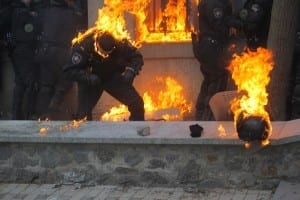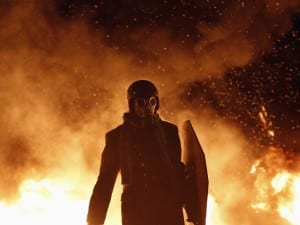Ukraine and Russia

Interwoven corruption and histories
Article: Taylor Rattray – Contributor
[dropcaps round=”no”]F[/dropcaps]or the last few months, headlines regarding protests in the Ukraine have dominated the news. Now, Russian military troops are occupying the Crimean peninsula of Ukraine. Some believe this civil unrest could lead to a revolution or even a civil war in Ukraine. Dr. Martin Hewson, a political science professor at the University of Regina, explains how this all came to pass.
Hewson states, “The old Ukrainian government was just about to sign a deal with the European Union, but the government, at the last minute, decided to sign an agreement with Russia. In other words, the government decided to reach away from Europe and towards Russia.” The agreement, called the Association Agreement and Free Trade Agreement, was an act to seek closer economic ties with the European Union. But, Russia was willing to offer more money and cheaper gas prices to Ukraine, without any major regulation and law changes, and the agreement with the European Union was suspended. Since late November when this agreement fell through, Ukrainians have been protesting against the government’s desire to seek closer relations with Russia. These demonstrations have erupted into protests against government corruption and unfair human rights in the Ukraine.
In February, revolutionaries were able to topple the old Ukrainian government, giving the opposition a majority and allowing parliament to impeach President Viktor Yanukovych. A new, pro-western government now leads the Ukraine.
Hewson says, “The Russians are outraged by this. They say this new government is not legal, that it was a coup, and refuse to recognize it…The Russians say that there was a signed agreement with the old government, and that that should be respected.”
This is what has led to Russian occupy of Ukrainian territory.
Crimea, the southeastern region of Ukraine, has been recently occupied by Russian military troops following the revolutionary protests. The area is governed by the Constitution of Crimea in accordance to the laws of the Ukraine. According to Hewson, “[Russian speakers] are particularly concentrated in Crimea; the majority of the people who live in Crimea are Russians. The Russians also have several big military bases in Crimea, and that’s what enabled the Russians to take over Crimea without a shot being fired.”
While the interim government of Ukraine classifies these events as an invasion of Ukraine, Crimean Prime Minister, Sergey Aksyonov, appealed to Russia for assistance on the peninsula. The interim government of Ukraine states the appointment of the Sergey Aksyonov is unconstitutional. As well, Viktor Yanukovich sent a letter to Russian President, Vladimir Putin, asking him to use military force in Ukraine to restore order. Later on, as the situation developed, the Crimean parliament sought to succeed from Ukraine by means of parliamentary vote. Whether or not this unilateral succession will be permitted has yet to be seen. However, as it currently stands the Crimean peninsula is home to a majority Russian population that overwhelmingly has sought unification with Russia. Pro-Russian residents have stormed Ukrainian government offices on the peninsula and have clashed with pro-Ukrainian groups.
European governments, as well as American and Canadians governments, have largely condemned Putin’s actions in Crimea, and recognize the new, pro-western government in Ukraine. But, there is only so much the west can do.
Hewson says, “The top priority for the west, of course, is not to do anything that will start any kind of war with Russia. That would be incredibly stupid.”
Additionally, Hewson adds that Russia gets most of its money from exporting oil and natural gas, which western countries still need.
“Ukraine is totally dependent on Russia for its natural gas [and]… until recently, they bought their natural gas at a discount [from Russia]. So they’ve got to find a way to pay their bills.”
Hewson states western governments have “tried to make some promises to the new Ukrainian government [and] the Europeans are promising to give them some money. There’s not a lot else they can do.” This can largely be attributed to the vast majority of Russian gas pipelines being run through Ukraine. This also has the added implication of Ukraine possessing tremendous sway over Russian oil entering Europe, a massive market that Russia relies on. Also on the peninsula and surrounding areas there are large oil deposits and well sites. Most of which are Russian owned.
The G8, a forum for the governments of eight leading industrialized countries, including Canada, France, Germany, Italy, Japan, Russia, the United Kingdom, the United States of America, and the European Union, claims Russia’s membership in the forum is at risk.
Canadian Prime Minister Stephen Harper stated at an annual convention of the Prospectors and Developers Association of Canada that, “The situation in Ukraine remains extremely serious for global peace and security. Canada and its G7 partners have spoken with one voice in condemning President Putin’s military intervention in Ukraine.”
But, expulsion requires consensus among the seven other members of the G8, and Germany has expressed disagreement in ousting Russia from the forum. The summit, to be hosted in Sochi, will be a decisive moment in international
As for the future of Ukraine, many in the west must simply wait and see what happens. Hewson says, “I hope that the new Ukrainian government can step back from any provocations against Russia that will give Russians an excuse to take over more parts of the Ukraine.” He states, “There are other parts of the Ukraine where Russians live and have been demonstrating, and I think the new Ukrainian government has to be very careful not to provoke the Russians to take over.”
A Crimean referendum will occur on March 16, 2014, to determine whether Crimea will become reunited with Russia or remain part of the Ukraine. Many governments, including Canada, Germany, and the United States, claim this referendum is illegal and will not recognize its results. Additionally, on May 25, 2014, elections will be held in Ukraine to determine a new president. Only time will tell where this situation will lead.
[button style=”e.g. solid, border” size=”e.g. small, medium, big” link=”” target=””]Image: blogs.ft.com[/button]












[…] the fall of former Ukrainian President Viktor Yanukovych, the Maidan Revolution set sail; it left Ukraine in a vulnerable position. Seizing the opportunity, Russia invaded and took control over the Crimean […]